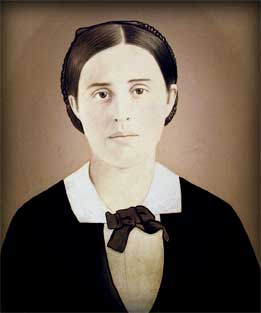
Eliza Swena Wookey as a young teacher
The following account was copied from an old cracked, yellowed
letter that was written by Eliza Wookey (Aunt Lide) in about 1882.
She must have written it after speaking to her children and her
nieces and nephews. The child, Harrie, mentioned below was
probably her niece, Harriet Overton.
Aunt Lide’s Remembrances (1882)
“Now Auntie,” said Harrie, as Aunt Lide leaned
back and pushed her spectacles on the top of her head, “tell us about the Indians, please.”
Aunt Eliza "Lide" Wookey’s response:
It was twenty years ago, and there were wild Indians
passing to and fro through these hills, often stealing down
to Keefer’s or Bidwell’s after night to get ammunition to
slay some unwary teamster.
It was in ’62, that the Hitchcock children were killed
on Rock Creek. It’s good that Bod Anderson, and many
others of the early settlers, scoured these hills killing all
the grown Indians they could find. Still, the very next
year, Big Foot Jack with a party of his Indians killed a
woman and her five children near Chico. On their flight
through the country, they came across the Lewis children
going home from school and killed two dear little boys.
How well I remember little Johnnie Lewis coming up
to me for a goodnight kiss as he started home. I can see
his fair open brow, white hair, and blue eyes as he raised
them to mine. “Teacher.” and his little lips trembled. He
|
had been a little naughty that day, and I patted his hand;
the sensitive child could not forget it. “Teacher, you will
never punish me anymore.”
”No Johnnie, be a good boy, and teacher will not have
to punish you anymore,” said I.
“You will never punish me anymore,” persisted the
little fellow.
“And I will never punish you again,” I said, and
after another kiss, the child hurried after his brother and
sister.
Later that day, while stooping down to take a drink
from Berry Creek, Jimmie Lewis was shot through the
head by Indians, while little Johnnie and his sister,
Thankful, were taken prisoners. After dragging Johnnie
15 miles until his tender feet were blistered and he could
travel no more, the savages beat his brains out and threw
him in a Manzanita bush.
While Thankful was forced to walk all night, the
Indians were kicking her with their feet and beating her
with their guns.
Strange to say, she eluded them the next morning and
reached a sheep camp on Chico Creek. She was so exhausted and frightened that, at first, all she could remember was
she had been to school and her teacher’s name. By and by
she so recovered as to lead a party of men back to where
Johnnie’s body was.
The next week, she was in school again, but I often
saw her sitting listless and thinking. Soon the tears would
trickle down her cheeks. Poor child, she was living over that
cruel march and the horrid beating those savages gave her.
And some of those Indians were found in the camp in
Chico. You may well be thankful that the Indians are not
now found in our hills like they were in those days. And
you children can climb the hills and explore the canyons
with no fear of being taken prisoner or killed by Indians.
Another perspective:
To fully understand the context of this vignette, one might need to
take a broader view of history. At the time of the westward
expansion of the US, the indigenous population had lived in union
with the land for roughly 15,000 years. When the Europeans
settled into what today we call California, the Native Americans
were sytematically uprooted from their lands and denied their way
of life. Conflict arose, and, as with other peoples and other places,
the culture with the superior might prevailed. Undoubtedly, lawless
renegades representing both camps were responsible for horrific
deeds. My people were the pioneers, so I read these stories as if
they were mine. Yet, to maintain my humanity, I must see myself
as a human being, first. From this perspective, I have nothing but
compassion for the Native American; and I weep for all loss of
human life.
Gary Bacon -- April 4, 2003
|









